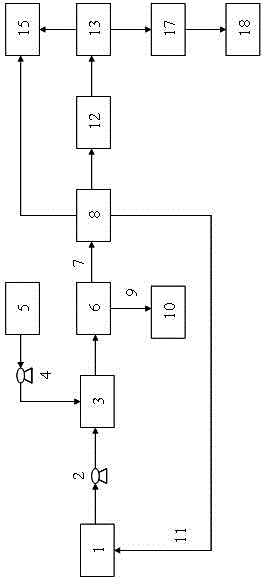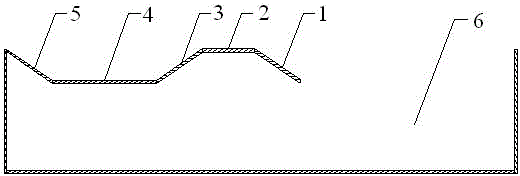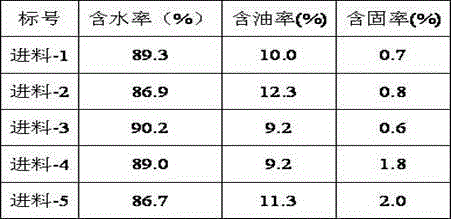Treatment process for oily sludge
A technology for treating sludge, applied in sludge treatment, water/sludge/sewage treatment, dehydration/drying/concentrated sludge treatment, etc. Unfavorable practical application and other problems, to achieve the effect of good demulsification characteristics, high surface activity, easy industrial application
- Summary
- Abstract
- Description
- Claims
- Application Information
AI Technical Summary
Problems solved by technology
Method used
Image
Examples
Embodiment 1
[0036] The concrete embodiment of the present invention is illustrated by taking the oil sludge at the bottom of a refinery as an example. The analysis of the oily sludge content of the feed is shown in Table 1. The weight percentages of the components of the demulsifier are: polyoxyethylene abietic acid (n=5) 7wt%, disodium cocoic acid monoethanolamide sulfosuccinic acid monoester ( R=C 12 ) 16wt%, formic acid 0.2wt%, water 76.8wt%. The dosage of demulsifier is 3% of the sludge weight. Using the process of the present invention to treat oily sludge, the water content of the discharged mud cake is reduced to 50.2%-52.3%, and the oil content is 18.2%-21.6%, as shown in Table 2. According to the material balance calculation, the volume of the sludge after dehydration treatment has been reduced by at least 10 times, which greatly reduces the difficulty of subsequent sludge treatment. The contents of chemical oxygen demand (COD) and suspended solids (SS) in the filtrate are show...
PUM
 Login to View More
Login to View More Abstract
Description
Claims
Application Information
 Login to View More
Login to View More - R&D
- Intellectual Property
- Life Sciences
- Materials
- Tech Scout
- Unparalleled Data Quality
- Higher Quality Content
- 60% Fewer Hallucinations
Browse by: Latest US Patents, China's latest patents, Technical Efficacy Thesaurus, Application Domain, Technology Topic, Popular Technical Reports.
© 2025 PatSnap. All rights reserved.Legal|Privacy policy|Modern Slavery Act Transparency Statement|Sitemap|About US| Contact US: help@patsnap.com



